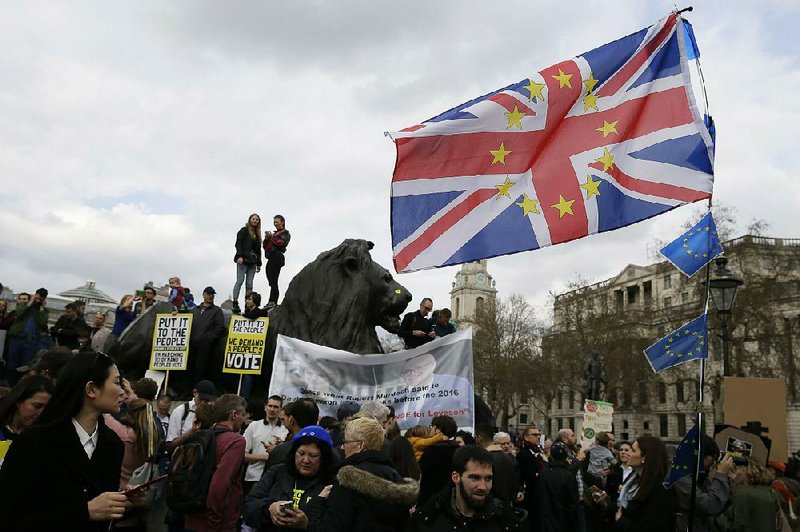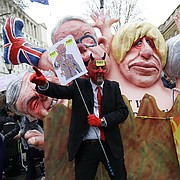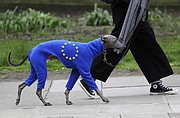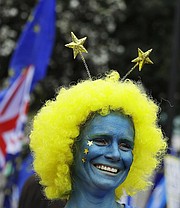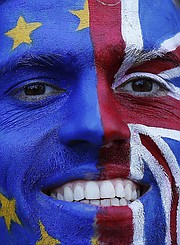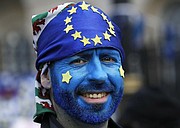LONDON -- The struggle over Britain's exit from the European Union spilled onto the streets of London on Saturday in a show of frustration over the political limbo -- as protesters demanded that the issue be put back to the people with a fresh vote that would include the option of staying in the EU.
The "Put It to the People" march in central London was seen as unlikely to change the course of the exit impasse, with time running out to decide Britain's next moves. But the public outcry reflects an option that was once unthinkable: sending the entire question back to the voters.
Demonstrators from the Scottish Highlands to the Cornish coast descended on the British capital, filing out of buses and subway stations. They joined in pro-EU chants, waved EU flags, painted their faces in EU blue and hurled choice insults at effigies and images of Prime Minister Theresa May, whose exit plan has been strongly rejected twice by Parliament.
"Ikea Has Better Cabinets," said one placard.
Politicians including Labor Party deputy leader Tom Watson addressed thick crowds at Parliament Square. "Prime minister, you've lost control of this process," he said. "Let the people take control."
May also faces rising pressure from her Conservative Party to either step down or set a date for her resignation as her political support continues to wilt. The coming week is seen as crucial as political rivals jockey for position to succeed her.
Conservative Party legislator George Freeman said a new leader is needed.
"I'm afraid it's all over for the PM. She's done her best. But across the country you can see the anger. Everyone feels betrayed. Government's gridlocked. Trust in democracy collapsing. This can't go on. We need a new PM who can reach out & build some sort of coalition for a Plan B," he tweeted.
Liberal Democrat leader Vince Cable, invited to help lead the march in favor of a second referendum, called the crowd gathered in central London impressive and unified.
"There is a huge turnout of people here from all walks of life, of all ages and from all over the country," he tweeted. "We are a Remain country now with 60 percent wanting to stop the Brexit mess."
Police did not provide a crowd estimate Saturday. Independent legislator Chuka Umunna and others supporting a second EU-exit referendum estimated the crowd at 1 million. If the official estimates go that high, then the march would be one of the biggest demonstrations Britain has ever seen.
More than 4 million people endorsed an electronic petition last week in favor of revoking Article 50, the act that formally triggered the exit process.
TROUBLE IN PARLIAMENT
In a letter to lawmakers on Friday night, May said she might not seek passage of her exit plan in Parliament this week. The embattled leader said she would only take her EU divorce plan back to Parliament if there seemed to be enough backing for it to pass.
"If it appears that there is not sufficient support to bring the deal back next week, or the House rejects it again, we can ask for another extension before 12 April, but that will involve holding European Parliament elections," she said.
She also said she would need the approval of House Speaker John Bercow to take the plan to Parliament for a third time. Bercow has said that unless May's divorce plan is altered, a third vote would violate parliamentary rules against repeatedly voting on the same thing.
Almost three years after Britons voted to walk away from the EU, the bloc's leaders last week seized control of the exit timetable to avert a departure on Friday that would be disruptive for the world's biggest trading bloc and deeply damaging for Britain.
EU leaders at a summit in Brussels set two deadlines for Britain to leave the bloc of nearly half a billion people or to take an entirely new path in considering its EU future.
They agreed to extend the exit date until May 22, the eve of the EU Parliament elections, if May can persuade the British Parliament to endorse her divorce deal.
Failing that, they gave May until April 12 to choose between leaving the bloc without a divorce deal or deciding on a radically new path, such as revoking Britain's decision to leave, holding a new referendum on the exit or finding a cross-party consensus for a very different kind of exit.
Despite May's letter to lawmakers, it was not clear what path her minority government would take this week.
Critics argue that a second referendum would be deeply damaging to democracy and a betrayal of those who chose to leave.
But a no-deal exit carries its own issues. Britain has staged dress rehearsals for some of the scenarios of leaving the EU without a firm breakup plan: possible medicine shortages and large traffic jams for trucks having to deal with customs controls.
Supporters of a second referendum say the first vote was a singular moment in time and point to allegations of rule-breaking by the campaigns for and against.
If a do-over is going to happen, then it's not just the people noisily cheering outside the Parliament building on Saturday that need to get behind the idea. Only a handful of Conservative lawmakers are calling for a second referendum, and while the opposition parties back the idea, support from some quarters seems lukewarm.
A second referendum would also take an estimated five months to organize.
"It's unlikely at the moment, simply because there just doesn't seem to be support for Parliament," said Anand Menon, a professor of European politics at King's College London. But, he added, "anything is a possibility."
The British prime minister has made it clear she is opposed to a second referendum. If she doesn't gain approval for her withdrawal deal on its third outing, however, then Parliament could start to seize control of the exit process. One option is to hold a series of "indicative votes" that would help to sift out what Parliament does want.
Britain could just cancel the exit. The petition to revoke Article 50 -- effectively the EU-exit papers -- is now one of the most popular petitions on the British Parliament's website.
But even though Britain can, in theory, pull the plug on the exit, the more likely route to staying in the EU would be by putting a vote to the people again.
That's what Emma Knuckey, 38, said she wants. She voted to leave in 2016 in part because of an infamous red double-decker bus with its claim that money sent to the EU could instead be used to fund Britain's national health-care system.
She's no longer convinced by the argument that an exit from the EU would mean more money for Britain's health service, and she said she doesn't like how EU citizens living in Britain have been used as "bargaining chips."
"I'd rather put it to the people," she said. "I don't want people to be in any kind of limbo because I was swayed over by a mistake."
Edmund Sides, 63, spent three weeks walking from Wales to London in order to take part in Saturday's march.
Sides, a geologist, said he wanted to be able to speak to people along the way, encouraging families that have been split by the issue to mend their fences and talk.
"The whole country isn't doing enough of that," he said.
He said he is worried about the vicious tone that exit arguments have started to take and about national cohesion.
"People fear the atmosphere is very dangerous in this country," Sides said.
Information for this article was contributed by Karla Adam and William Booth of The Washington Post; and by Gregory Katz, Danica Kirka and Jill Lawless of The Associated Press.
A Section on 03/24/2019
